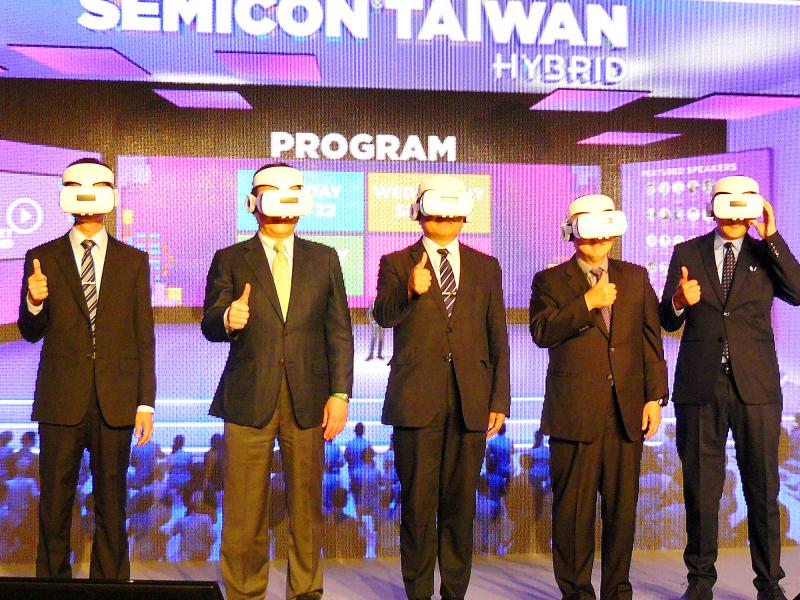The production value of the nation’s semiconductor industry is expected to grow 16.7 percent this year from last year, outpacing the global industry’s 3.3 percent growth, industry association SEMI said yesterday.
That would help Taiwan safeguard its second spot in the global semiconductor market with a production value of more than NT$3 trillion (US$102.73 billion), SEMI Taiwan president Terry Tsao (曹世綸) told a media briefing in Taipei for the Semicon Taiwan trade show beginning today.
The global semiconductor industry’s production value is expected to increase to US$426 billion this year, SEMI said.

Photo: CNA
In terms of semiconductor equipment investment, equipment billings from Taiwanese firms rose 10.6 percent to US$8.63 billion during the first seven months of this year, ranking third in the world, SEMI’s tally showed.
China was the largest semiconductor equipment market with investment of US$9.84 billion during the January-to-July period, surging 45.2 percent from a year earlier, data showed.
South Korea came next with semiconductor equipment investment soaring 54.1 percent to US$9.49 billion.
“The COVID-19 pandemic does not slow down the global semiconductor industry’s investment in manufacturing equipment,” Clark Tseng (曾瑞榆), director of the industry research and statistics unit of SEMI Taiwan, told reporters.
North America-based manufacturers of semiconductor equipment last month posted US$2.6 billion in worldwide billings, up 32.5 percent annually, after hitting the highest level in about two years in July, Tseng said.
The global semiconductor equipment market is to climb to US$65 billion this year and rise further to US$70 billion next year, SEMI said.
The forecast did not take into account the US’ export restrictions on Huawei Technologies Co (華為) and potential sanctions against China’s biggest chipmaker, Semiconductor Manufacturing International Corp (SMIC, 中芯).
The US-China trade dispute would pose a greater threat to semiconductor supply chains over next two to three years if SMIC and other Chinese companies were to be placed on the US’ entity list restricting US semiconductor equipment suppliers from selling equipment to Chinese companies, Tseng said.
SMIC accounted for 30 percent of China’s semiconductor equipment market, he said.
The company has spent an average of US$3 billion to US$5 billion a year on new equipment over the past few years, he added.
The Chinese chipmaker has revised up its capital spending for a second time to more than US$6.7 billion this year to buy as much equipment as possible before being blacklisted by the US, Tseng said.
Tseng’s comments echoed those of ASE Technology Holding Co (ASE, 日月光投資控股) chief operating officer Tien Wu (吳田玉), who also spoke at the media briefing.
Wu said that rising protectionism, “parallel universes” and remote connections are three major challenges awaiting the global semiconductor industry in the post-COVID-19 era.
“Parallel universes” means that the world has divided into two camps that do not communicate with each other and differ in regulation, Wu said, implying that the world is divided into Chinese and US camps with different regulations, manufacturing materials and design systems.
Commenting on rebuilding the global semiconductor supply chain amid the US-China trade dispute, Wu said that it takes time for corporate executives to come up optimal decisions, given greater uncertainty of the external environment.
ASE and its semiconductor peers have the ambition to reshape the supply chain, he said.

In Italy’s storied gold-making hubs, jewelers are reworking their designs to trim gold content as they race to blunt the effect of record prices and appeal to shoppers watching their budgets. Gold prices hit a record high on Thursday, surging near US$5,600 an ounce, more than double a year ago as geopolitical concerns and jitters over trade pushed investors toward the safe-haven asset. The rally is putting undue pressure on small artisans as they face mounting demands from customers, including international brands, to produce cheaper items, from signature pieces to wedding rings, according to interviews with four independent jewelers in Italy’s main

Japanese Prime Minister Sanae Takaichi has talked up the benefits of a weaker yen in a campaign speech, adopting a tone at odds with her finance ministry, which has refused to rule out any options to counter excessive foreign exchange volatility. Takaichi later softened her stance, saying she did not have a preference for the yen’s direction. “People say the weak yen is bad right now, but for export industries, it’s a major opportunity,” Takaichi said on Saturday at a rally for Liberal Democratic Party candidate Daishiro Yamagiwa in Kanagawa Prefecture ahead of a snap election on Sunday. “Whether it’s selling food or

CONCERNS: Tech companies investing in AI businesses that purchase their products have raised questions among investors that they are artificially propping up demand Nvidia Corp chief executive officer Jensen Huang (黃仁勳) on Saturday said that the company would be participating in OpenAI’s latest funding round, describing it as potentially “the largest investment we’ve ever made.” “We will invest a great deal of money,” Huang told reporters while visiting Taipei. “I believe in OpenAI. The work that they do is incredible. They’re one of the most consequential companies of our time.” Huang did not say exactly how much Nvidia might contribute, but described the investment as “huge.” “Let Sam announce how much he’s going to raise — it’s for him to decide,” Huang said, referring to OpenAI

The global server market is expected to grow 12.8 percent annually this year, with artificial intelligence (AI) servers projected to account for 16.5 percent, driven by continued investment in AI infrastructure by major cloud service providers (CSPs), market researcher TrendForce Corp (集邦科技) said yesterday. Global AI server shipments this year are expected to increase 28 percent year-on-year to more than 2.7 million units, driven by sustained demand from CSPs and government sovereign cloud projects, TrendForce analyst Frank Kung (龔明德) told the Taipei Times. Demand for GPU-based AI servers, including Nvidia Corp’s GB and Vera Rubin rack systems, is expected to remain high,